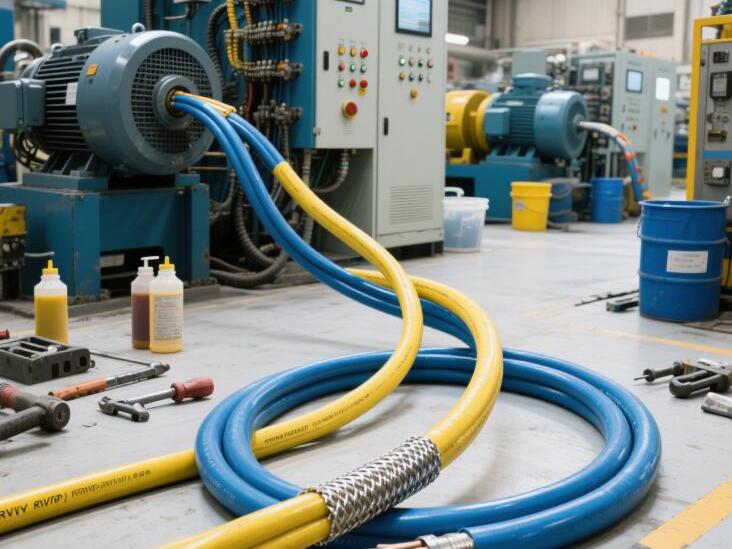In industrial environments where oil, grease, and other harsh substances are routine, the importance of using high-quality oil-resistant wires cannot be overstated. These specialized cables play a vital role in ensuring durability, reliability, and safety in demanding conditions.
At ECHU, we pride ourselves on producing top-of-the-line oil-resistant wires tailored to meet the needs of industries worldwide. In this comprehensive guide, we explore two of the most sought-after oil-resistant wire types in the market—RVVY and RVVYP—to help you identify the best option for your specific applications.
Oil-resistant wires are designed to withstand harsh environments where exposure to oil, grease, and lubricants is common. Their specialized insulation and jacketing materials resist chemical degradation, ensuring the integrity of electrical connections over the long term.
Chemical Resistance: They maintain performance when exposed to oils, industrial fluids, and cleaning agents.
Durability: Superior abrasion resistance and enhanced toughness make them ideal for demanding applications.
Electrical Safety: High insulation properties prevent short circuits and other electrical hazards.
Industries that rely heavily on oil-resistant cables include:
Manufacturing Plants: For powering heavy machinery and assembly line equipment.
Automotive Sector: Used in vehicle wiring and robotic arms in production facilities.
Food Processing: Helps ensure cleanliness and resilience in environments where oils and fluids are commonplace.
Heavy Equipment: Ensures stable electrical performance in harsh industrial or marine conditions.

What Are RVVY Wires?
RVVY wires are highly durable electrical cables known for their exceptional oil resistance and flexibility. These wires are engineered with robust insulation and outer coatings designed to withstand exposure to oils, chemicals, and physical stresses.
Composition: Constructed from premium-grade copper for conductivity, with PVC insulation and jacketing for added protection.
Oil Resistance: The outer layer prevents degradation caused by oils and industrial fluids.
Abrasion Resistance: Designed to tolerate mechanical stress and movement over time.
Conveyor systems in production plants.
Machine tools that frequently encounter oils and lubricants.
Electrical control systems requiring flexible cabling solutions.
ECHU’s RVVY wires stand out for their precision engineering and compliance with international safety standards. Our wires are rigorously tested to ensure optimal performance, even in the most challenging environments.
What Makes RVVYP Wires Different?
Building upon the foundation of RVVY wires, RVVYP cables include an additional layer of shielding, offering superior protection against electromagnetic interference (EMI). This makes them particularly valuable in environments that demand stable signal transmission.
Shielding: Equipped with a braided or foil shielding layer to prevent signal loss or distortion caused by external interference.
Enhanced Oil Resistance: Offers superior resilience against oil, grease, and chemicals compared to standard oil-resistant wires.
Flexibility and Strength: Flexible yet durable enough to handle repetitive mechanical movements in industrial applications.
Automated systems requiring EMI protection for accurate data transfer.
Instrumentation and control systems in factories or laboratories.
Communication equipment used in high-interference zones.
ECHU’s RVVYP wires bring unmatched reliability, ensuring seamless performance in high EMI environments while maintaining resistance to oil and physical wear. Customers across industries trust our products for their strict adherence to performance standards.
Selecting the ideal wire depends on your specific operational requirements. Below are the key differences to help you decide:
| Feature | RVVY | RVVYP |
|---|---|---|
| Shielding | None | EMI shielding for interference reduction |
| Oil Resistance | High | Enhanced |
| Applications | General industrial use | Sensitive systems requiring interference protection |
| Durability | Robust | Extremely robust |
| Cost | More budget-friendly | Slightly higher due to added shielding |
Application Environment: Are cables exposed to high EMI? If yes, RVVYP is the better choice.
Oil and Chemical Exposure: Both wires are reliable, but RVVYP offers enhanced resistance.
Budget Constraints: RVVY offers solid performance at a lower cost, while RVVYP provides extra features for critical applications.
When it comes to specialized cables, ECHU has earned a reputation as a global leader in innovation and quality.
Uncompromising Quality: All our wires, including RVVY and RVVYP, meet or exceed international standards.
Custom Solutions: We work closely with our clients to design custom products tailored to industry needs.
Diverse Portfolio: From general-purpose wires to highly specialized options, we offer solutions for all sectors.
Trusted by Industry Leaders: Hear from satisfied customers about how our wires enhanced their operations.
Understanding the differences between RVVY and RVVYP wires can simplify selecting the perfect solution for your industrial needs. Whether you need cost-effective oil-resistant wires or advanced shielding against EMI, ECHU has the expertise and products you can count on.
Ready to find your ideal oil-resistant wire?
Explore ECHU’s full range of RVVY and RVVYP wires, or contact us today for expert guidance and customized solutions!
1. What does oil resistance mean in wires?
Oil resistance refers to a wire’s ability to withstand degradation caused by oils, lubricants, and similar substances, ensuring long-term performance.
2. Are RVVY and RVVYP wires flame retardant?
Yes, both wire types adhere to flame-retardant standards, enhancing their safety in critical environments.
3. How do RVVY wires perform in high-temperature environments?
RVVY wires are designed to tolerate moderate to high temperatures, with specialized versions available for extreme conditions.
4. Can RVVYP wires be used outdoors?
While primarily designed for indoor applications, RVVYP wires with additional weather-resistant coatings can be used in outdoor setups.

